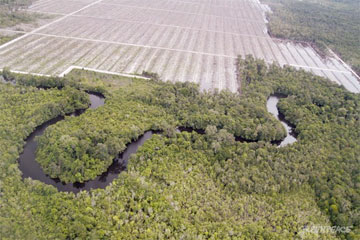 Crossposted from the Biodiversivist blog
Crossposted from the Biodiversivist blog
Brace yourselves for another thought exercise.
Tim Searchinger is a researcher who has been published in the prestigious journal Science at least five separate times by my count. His, in hindsight, rather obvious, common sense observations have become a serious thorn in the side of the biofuel industry.
He was one of the first to raise the alarm about indirect land use issues (using corn for ethanol sent a price signal to clear more farmland from carbon sinks). He was the first to point out that government subsidies for biomass will aggravate global warming by motivating people to cut down trees. Burning trees to make electricity will release their carbon into the atmosphere. The seedlings planted to replace those trees will take decades to remove that carbon and store it again. Meanwhile, the CO2 from the trees that were burned will heat the planet for decades. We don’t have decades.
Because of the great potential for profit, attention has focused on technology (hybrid and electric cars, solar, wind, nuclear, biofuels, and biomass) that will release less CO2. Very little attention has been paid to the other half of the global warming solution (getting the excess CO2 back out of the atmosphere) because nobody has figured out a way to get rich by just leaving forests and grasslands alone.

Photo by Mongabay
Case in point, Mongabay has an article up titled Scientists blast greenwashing by front groups:
The Consumer Alliance for Global Prosperity (CAGP) is a new group based in Washington D.C. that has launched a campaign against American firms that have adopted sustainability criteria in their sourcing policies. Companies targeted consist mostly of retailers that have dropped APP [Asia Pulp & Paper] from their stores, including Office Max, Staples, and Office Depot, but not Walmart, which has cut ties with APP except for its Walmart China division. The Consumer Alliance for Global Prosperity claims that these corporations are colluding with unions and “radical environmental activists” to hurt consumers in the United States.
“The ‘Empires of Collusion’ continue to push an anti-prosperity, anti-trade agenda,” CAGP says in its campaign materials. “This coordinated campaign is run by radical environmentalists and others against the producers of pulp and paper from the developing world, destroying the livelihoods and aspirations of thousands of the world’s poor.”
“This initiative will fight back against anti-trade, anti-prosperity collusion among international Green NGOs, American trade union bosses, and corporations looking to eschew the rigors of a competitive marketplace.”
How much a given biofuel reduces production of CO2 depends on how much fossil fuel is used to make that biofuel. No crop-based biofuel is carbon neutral. Cane ethanol and palm oil biodiesel come the closest but they all increase greenhouse gases to one degree or another.
But, unlike fossil fuels, the usurpation of water and arable land to grow biofuels inversely impacts our ability to allow forests and grasslands to remove the CO2 that’s already in the atmosphere (as well as the CO2 being added with each gallon of biofuel burned). This is an extra downside to biofuels that fossil fuels don’t share. Put another way, today’s crop-based biofuels are hogging up the land and resources we need to store carbon.
In a nutshell, agrofuels are a dead end idea, a dog barking up the wrong tree. There are many ways to reduce CO2 production other than simply exchanging gallon for gallon the fossil fuels in our gas hog cars for liquid fuels made from the rapidly unraveling fabric of our biosphere.
We must reduce CO2 production while increasing CO2 absorption: Absorption/Production > 1, or Production < Absorption.
Until some biological process absorbs it, CO2 tends to stay put. Plants are the only means we have of removing excess CO2 from the air and safely storing it as carbon. In theory, if we could grow enough plants we would not have to cut back on fossil fuel use to avoid global warming because those plants would absorb and then store all of the CO2 produced by the fossil fuels. This would require roughly tripling the amount of land covered by forest and grassland. Unfortunately, that much water and unused arable land does not exist.
And keep in mind, those plants have to be alive to store carbon. They can’t be used for fuel, or food (which is fuel for people).
The biofuel lobby appears to have concluded that this is one argument they are not going to win so they have switched tactics. No longer do they mention greenhouse gases or global warming in their press releases. Instead, they stick to exaggerating claims of clean air and job creation, while fanning the flames of xenophobia by suggesting corn ethanol is a stepping stone to energy independence (when in reality, it has hogged up all of the market leaving nothing for potential next generation fuels).
It seems that few people are interested in just leaving forests and grasslands alone to absorb carbon. The whole idea seems somehow wasteful. Where’s the money in that? Global warming is essentially a shot across the bow warning us that we have finally exceeded a planetary limit. Speaking of which, and as icing on the biofuel cake, biofuels are also exacerbating other planetary limits.



